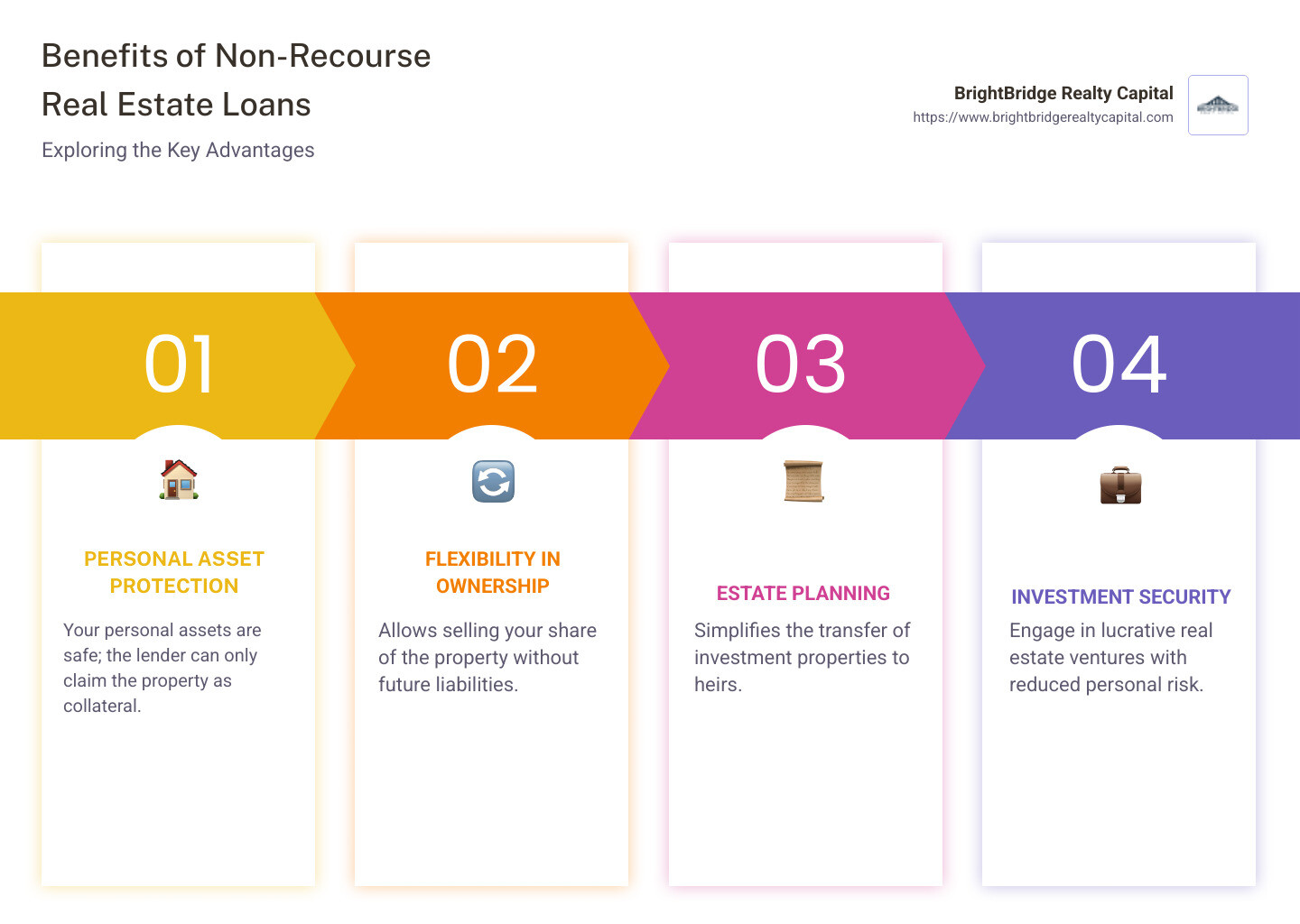The Ins and Outs of Non-Recourse Real Estate Loans

Non-recourse real estate loans are a unique financing solution offering distinct benefits for borrowers in the real estate market.
- Key Benefits of Non-Recourse Real Estate Loans:
- Personal Asset Protection: If you default on the loan, your personal assets are safe, as the lender can only claim the collateral.
- Flexibility in Ownership Changes: These loans allow you to sell your share of the property without future liabilities.
- Estate Planning Advantages: They simplify the transfer of investment properties to heirs, often without imposing further qualification problems.
Designed for real estate investors and developers, these loans are secured solely by the collateral (like the property itself), not by your personal worth. This means if the loan defaults, the lender’s recovery is limited to the collateral, safeguarding your personal assets.
While offering significant protection, non-recourse loans generally come with higher interest rates and require stronger collateral. This nuanced balance makes them popular among sophisticated investors seeking to protect personal assets, while still engaging in lucrative real estate ventures.

Know your non-recourse real estate loans terms:
Understanding Non-Recourse Real Estate Loans
Non-recourse real estate loans are a unique breed in finance. They offer a significant advantage: borrower protection. These loans are secured by collateral, typically the property being financed, which means that if you default, the lender can seize this collateral. However, they cannot pursue your personal assets to recover any remaining debt. This feature makes non-recourse loans quite attractive to borrowers who want to safeguard their personal assets.

Key Features
Secured by Collateral: The loan is backed by the property itself. If you can't repay, the lender's only recourse is to take and sell the property.
Borrower Not Personally Liable: Unlike recourse loans, your personal assets are not at risk. The lender cannot come after your home, car, or bank accounts if the property’s value doesn't cover the debt.
Higher Interest Rates: Because lenders take on more risk with non-recourse loans, they usually charge higher interest rates to compensate for this risk.
Differences from Recourse Loans
Recourse loans allow lenders to pursue additional compensation if the collateral doesn't cover the full loan balance. This means that, in the event of default, they can seize other personal assets. On the other hand, non-recourse loans limit the lender's recovery strictly to the collateral.
Asset Seizure Limits: With non-recourse loans, the lender can only claim the collateral. In contrast, recourse loans give lenders the ability to seize other assets beyond the collateral.
Personal Asset Protection: This is the hallmark of non-recourse loans. Your personal wealth remains untouched, a key reason why many investors favor this option.
Lender Recourse: In recourse loans, lenders have broader recovery options, making them less risky for lenders but more risky for borrowers.
Non-recourse loans provide a shield for borrowers, but they also shift more risk onto the lender. This dynamic creates a balance where borrowers can engage in real estate projects without the fear of losing personal assets, albeit at the cost of higher interest rates and stringent qualification requirements.
How Non-Recourse Real Estate Loans Work
Non-recourse real estate loans are a cornerstone of commercial real estate financing. They are particularly suited for projects where the lender's repayment depends on the success of the project itself.
Common Uses
Commercial Projects: These loans are frequently used for commercial real estate, such as shopping centers, office complexes, and hotels. The property acts as the collateral, and the loan is repaid from the project's profits.
Real Estate Development: Developers use non-recourse loans to fund large projects that might not generate immediate income. For example, a developer building a new apartment complex might rely on future rental income to pay back the loan.
Financial Industries: Non-recourse loans are also used in financial industries where securities act as collateral. They provide a way to leverage assets without risking personal wealth.
Qualification Criteria
Qualifying for a non-recourse real estate loan can be challenging. Lenders are taking on more risk, so they set high standards for borrowers.
High Credit Scores: Borrowers typically need excellent credit to qualify. This reassures lenders that the borrower is financially responsible.
Low Loan-to-Value Ratio: A low loan-to-value (LTV) ratio is crucial. This means that the loan amount is relatively low compared to the value of the property. It gives lenders a cushion in case property values decline.
Debt Service Coverage Ratio (DSCR): A DSCR of at least 1.25 is often required. This ratio compares the property's net operating income to its debt obligations, ensuring the borrower can cover loan payments comfortably.
Non-recourse loans are a powerful tool for real estate investors. They enable projects that might otherwise be too risky, offering a path to potential profits without jeopardizing personal assets. However, the stringent qualification criteria mean that only the most financially stable borrowers can access this type of financing.
Benefits and Drawbacks
Benefits
1. Personal Asset Protection
One of the biggest perks of non-recourse real estate loans is that your personal assets are safe. If the project doesn't pan out, the lender can only seize the property used as collateral. Your home, car, or savings account are off-limits. This protection makes these loans particularly appealing to investors who want to limit their personal risk.
2. Estate Planning Advantages
Non-recourse loans also offer significant estate planning benefits. When the loan is tied to a property owned by an entity like an LLC, your heirs can inherit the property without the hassle of qualifying for the loan themselves. As long as payments are made on time, the lender won't question the heirs' financial qualifications. This can ease the transition and reduce stress during an already challenging time.
3. Flexibility
With a non-recourse loan, you have more freedom to sell your share of the property without worrying about future liabilities. This flexibility can be a game-changer for investors looking to capitalize on market opportunities or make strategic exits.
Drawbacks
1. Higher Interest Rates
The protection and flexibility of non-recourse loans come at a cost. Lenders often charge higher interest rates to compensate for the increased risk they're taking on. This can mean higher monthly payments and more interest paid over the life of the loan.
2. Stringent Qualifications
Qualifying for a non-recourse loan isn't easy. Lenders are cautious and set strict criteria. You'll need a high credit score, a low loan-to-value ratio, and a solid debt service coverage ratio. Meeting these benchmarks can be challenging, especially for newer investors or those with less-than-perfect credit.
3. Lender Risk
From the lender's perspective, non-recourse loans are risky. If the project fails, they can only recover the collateral, not any remaining debt. This risk is why lenders are selective about who they approve and why they might include "bad boy" carve-outs that could convert a non-recourse loan to a recourse one if the borrower engages in fraudulent activities.
Non-recourse real estate loans offer a unique blend of protection and flexibility, making them attractive for those who qualify. However, the higher costs and strict qualifications mean they're not for everyone. Understanding these pros and cons can help you decide if this type of financing aligns with your investment strategy.

Frequently Asked Questions about Non-Recourse Real Estate Loans
What are non-recourse loans?
Non-recourse loans are a type of financing where the lender can only seize the collateral if the borrower defaults. They cannot go after the borrower's other assets, like their home or savings. This makes them ideal for borrowers who want to limit their personal risk. In real estate, the property itself usually secures the loan, providing peace of mind to investors.
How do they differ from recourse loans?
The key difference between non-recourse and recourse loans lies in what happens if you default. With a recourse loan, the lender can pursue your personal assets beyond the collateral to recover their money. In contrast, with a non-recourse loan, the lender's recovery is limited to the collateral only. This makes non-recourse loans safer for borrowers but riskier for lenders, often leading to higher interest rates.
What are the qualification requirements?
Qualifying for a non-recourse real estate loan can be challenging. Here are the main criteria:
High Credit Scores: Lenders prefer borrowers with excellent credit histories.
Low Loan-to-Value (LTV) Ratio: This means the loan amount is low compared to the property's value, reducing lender risk.
Debt Service Coverage Ratio (DSCR): Typically, lenders look for a DSCR of at least 1.25. This indicates that the property's income can cover the loan payments comfortably.
Property Requirements: The property usually cannot be your primary residence and must meet specific conditions, like being built after 1940 and located in the U.S.
Meeting these requirements can be tough, but it makes the loan a viable option for those who qualify, offering personal asset protection and flexibility.
Conclusion
In the complex world of real estate financing, non-recourse real estate loans stand out for their unique benefits, offering personal asset protection and flexibility to investors. At BrightBridge Realty Capital, we specialize in providing customized financing solutions custom to meet the specific needs of each investor. Our expertise in quick and flexible funding solutions ensures that you can seize opportunities as they arise, without unnecessary delays.
One of our key strengths is our ability to close deals fast—often within a week—thanks to our streamlined process and direct lending approach. This means no middlemen, competitive rates, and a seamless experience from start to finish. Whether you're involved in commercial projects, real estate development, or other ventures requiring non-recourse loans, we have the experience and resources to support your investment strategy.
If you're ready to explore how non-recourse real estate loans can benefit your investment portfolio, we invite you to find more about our services and how we can assist you in achieving your financial goals.


